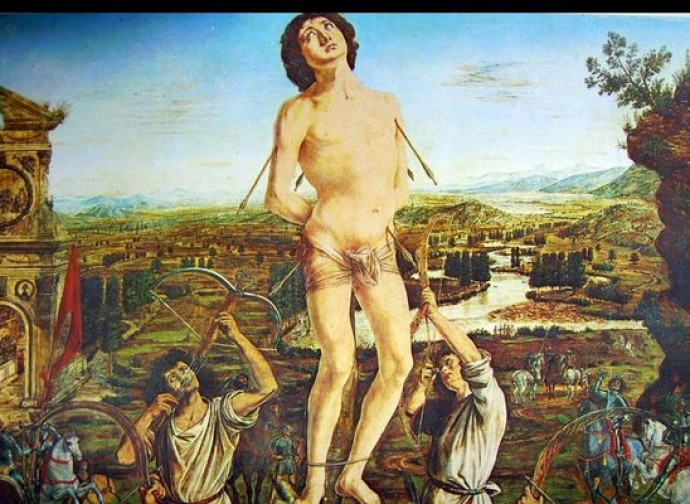Saint Sebastian
The ancient cult of Saint Sebastian is first documented in the Depositio martyrum of 336, a calendar with the days of the martyrs' burials used in the Church of Rome, under the date of January 20th.

The ancient cult of Saint Sebastian is first documented in the Depositio martyrum of 336, a calendar with the days of the martyrs' burials used in the Church of Rome, under the date of January 20th. His veneration is also mentioned in the Commentary on Psalm 118 by Saint Ambrose (340-397), according to which Sebastian had grown up in Milan and then moved to Rome. The first Passio about the Saint, attributed to Arnobius the Younger, is dated to the 5th century. It was followed over time by other hagiographies, including the one in the Golden Legend by Blessed Jacobus de Voragine.
The historical frame to Sebastian's martyrdom is the resumption of the persecutions under Diocletian. He led the Roman Empire from 284 to 305, mostly in partnership with Maximian. According to his biographers, Sebastian had embarked on a military career, earning the esteem of Diocletian and Maximian, who were unaware of his Christian faith. He was chosen as a tribune of the praetorian cohort, stationed in Rome for the protection of the emperor. When the persecutions began to rage, Sebastian used his position, as well as his prudence, to help the imprisoned Christians and provide for the burial of the martyrs.
One day two Christian brothers, Marcus and Marcellian, were arrested. Their father Tranquillinus managed to have their execution delayed by promising to convince them to honour the pagan gods. Suffering the pains of imprisonment and subjected to family pressure, the two young men were about to give in, when Sebastian intervened to encourage their faith: "Strong soldiers of Christ, do not let this tearful coaxing cause you to forsake the everlasting crown!" He then spoke to the parents about the certainty that, by persevering in their testimony of Christ, their children would prepare for them the way to Heaven; while Sebastian said these words in the darkness of the cell, everyone there saw a light illuminate his head and radiate throughout the room. Zoe, wife of the Head of the Imperial Chancery, who was accompanying her husband Nicostratus on a visit to the prisons, also witnessed the prodigy: the woman, who had been dumb for six years, knelt in front of Sebastian, who implored the help of God, made the sign of the cross on her lips and healed her.
The event was accompanied by a series of conversions, soon followed by the martyrdom of Mark and Marcellian, who were pierced by spears, Tranquillinus, who was stoned, and Zoe, who died suffocated by the smoke of a stake. Meanwhile, Sebastian, whom Saint Caius (pope from 283 to 296) had proclaimed "Defender of the Church", was imprisoned and then led to the emperor, who said to him: "I have always kept you among the first in my palace but you have worked in the shadow against me, insulting the gods." So Sebastian was tied to a pole on the Palatine Hill and shot by so many arrows that the soldiers believed him dead, and left his body on the hill to feed the wild animals.
Irene, the widow of the martyred Saint Castulus, and her servant Lucina came to retrieve Sebastian's body to give him a worthy burial but they realised that he was still alive, and cured him instead. Once recovered, he presented himself, without fear of being killed, before Diocletian and Maximian (who were on their way to venerate Sol Invictus in the temple built by Heliogabalus), and tried to persuade them to convert. After the surprise of seeing the officer still alive, Diocletian ordered his flagellation. Sebastian's corpse was then thrown into the Cloaca Maxima (Rome's sewage system), but following a dream it was immediately recovered by Lucina and buried ad Catacumbas, that is, in the place that since the first millennium was renamed the Catacombs of Saint Sebastian.
Patron of: archers, athletes, soldiers, upholsterers, city police; invoked against the plague
